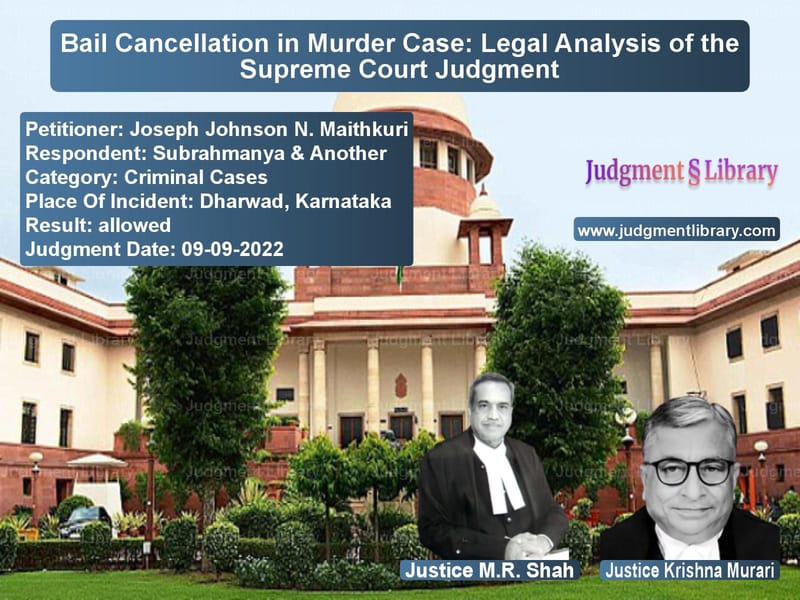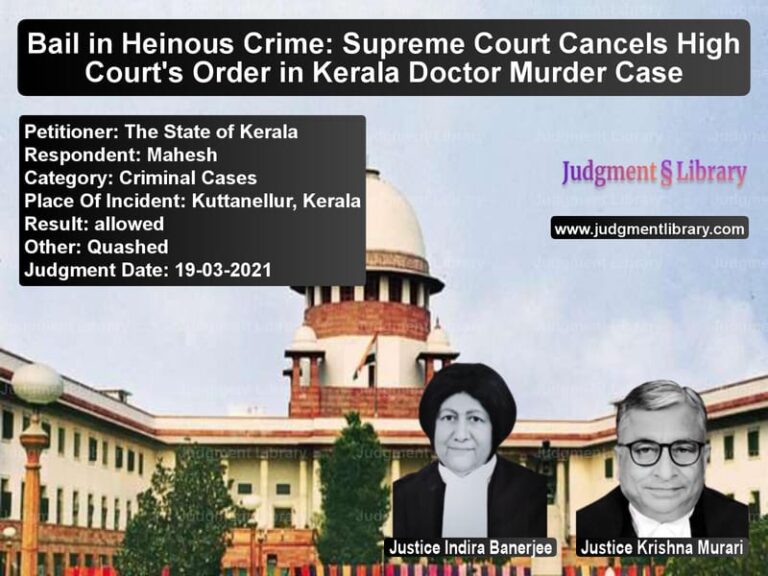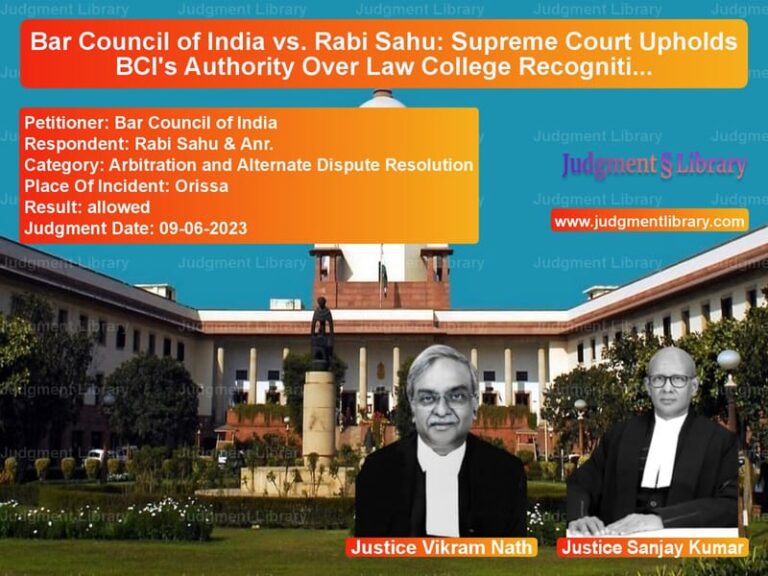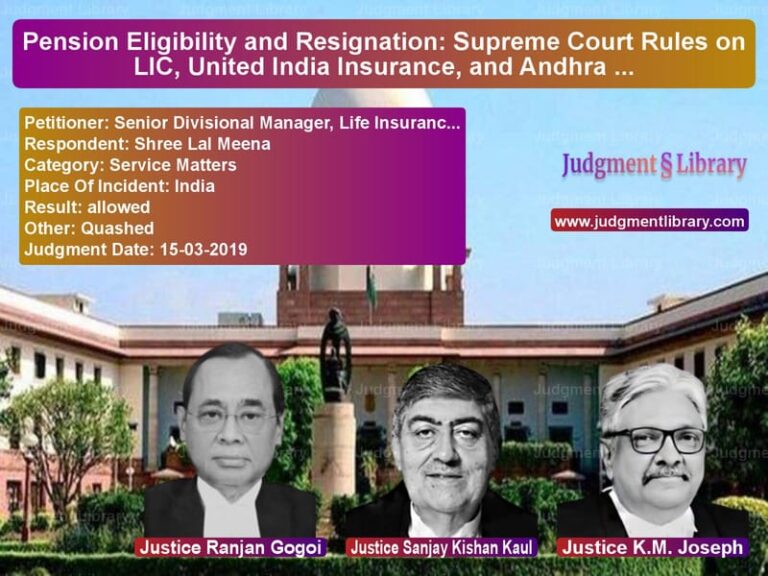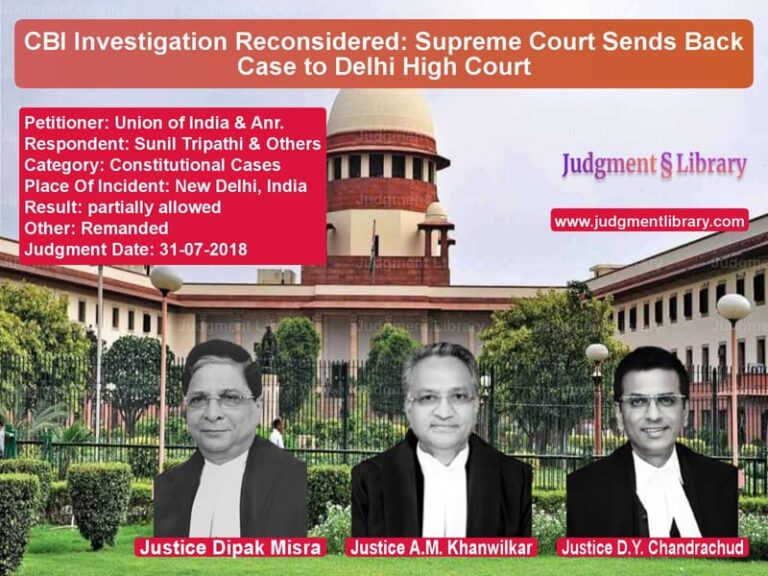Bail Cancellation in Murder Case: Legal Analysis of the Supreme Court Judgment
The case before the Supreme Court concerns the cancellation of bail granted to two accused individuals, Subrahmanya and Rajesh, in connection with a murder case. The appellants, who are the complainants in the case, challenged the bail granted by the High Court of Karnataka at Dharwad Bench, arguing that the gravity of the charges and the evidence against the accused warranted their continued detention. The Supreme Court considered the legal arguments put forth by the parties, the nature of the offenses, and the circumstances surrounding the granting of bail.
The central issue revolved around the legal correctness of the High Court’s decision to release the accused on bail despite the serious charges against them, including offenses under Sections 120(B), 302, 201 read with Section 34 of the Indian Penal Code and Section 27(3) of the Arms Act, 1959. The petitioners contended that the High Court had failed to properly weigh the severity of the offenses and the risk of tampering with evidence, especially since there were eyewitnesses to the crime.
Background of the Case
The case stems from a brutal murder that took place in Dharwad, Karnataka, which involved the killing of an individual. Subrahmanya and Rajesh were accused of being involved in the crime, with one of the accused, Subrahmanya, allegedly being the person who fired the fatal shots. The prosecution presented two eyewitnesses, CW18 and CW19, who identified the accused during the Test Identification Parade (TIP). These witnesses were critical to the prosecution’s case, and the identification of the accused played a significant role in the legal proceedings.
Read also: https://judgmentlibrary.com/supreme-court-acquits-two-trade-union-leaders-in-assam-murder-case/
Despite these factors, the High Court had granted bail to the accused, Subrahmanya and Rajesh, which led the complainants to file appeals in the Supreme Court, arguing that the decision was unjustified. They claimed that the seriousness of the offenses, the eyewitness accounts, and the potential for the accused to tamper with evidence warranted the cancellation of bail.
Petitioner’s Arguments
The petitioners, represented by the complainants, argued that the High Court had failed to consider the gravity of the offenses when granting bail. They highlighted that the murder was premeditated, and the accused had been identified by two eyewitnesses who had testified against them. The petitioners also pointed out that the accused had been involved in a conspiracy, as indicated by the charges under Section 120B (criminal conspiracy) of the Indian Penal Code.
Additionally, the petitioners referenced a similar case where the Supreme Court had canceled the bail of another co-accused, Umesh Nagappa, who was involved in the same case. The petitioners argued that the grounds for granting bail to the other accused were identical to those for Subrahmanya and Rajesh, and since the Supreme Court had set aside the bail for Umesh Nagappa, the same reasoning should apply to the other two accused.
Respondent’s Arguments
The respondents, representing the accused, argued that the High Court had properly considered the factors involved in granting bail. They emphasized that there was no direct evidence linking the accused to the murder, and the accusations against them were based primarily on circumstantial evidence. The defense also pointed out that the accused had been identified during the TIP, and any claims regarding the potential for witness tampering were speculative.
Read also: https://judgmentlibrary.com/supreme-court-modifies-sentence-in-maharashtra-assault-case/
The respondents further argued that the accused had not been involved in the direct commission of the crime, with no overt act alleged against them. According to the defense, the evidence presented did not establish that Subrahmanya or Rajesh had participated in the actual killing, as the fatal shots were allegedly fired by another co-accused. The defense also contended that there was no reason to deny bail to the accused, as they had no criminal history and had cooperated with the investigation.
Court’s Reasoning
The Supreme Court carefully considered the arguments presented by both sides, examining the seriousness of the charges, the nature of the evidence, and the likelihood of the accused tampering with the case. The Court noted that the High Court had failed to take into account the full implications of the charges against the accused, particularly the fact that the murder was premeditated and that the accused had been identified by eyewitnesses.
Furthermore, the Court highlighted the fact that the High Court’s reasoning had been based on conjecture, with the possibility of witness tampering not being sufficiently substantiated. The Supreme Court emphasized that the seriousness of the offense and the potential impact on the case should have been given more weight in the decision to grant bail.
The Court also noted that the High Court had not properly considered the risk of the accused attempting to influence the witnesses, particularly in light of the fact that the accused had been identified during the TIP. The Court referred to previous rulings that stressed the importance of considering the gravity of the offense and the likelihood of the accused interfering with the investigation when deciding whether to grant bail.
Judgment
The Supreme Court ultimately ruled in favor of the petitioners and set aside the High Court’s decision to grant bail to the accused. The Court emphasized that the High Court had not adequately considered the gravity of the offenses, the potential for witness tampering, and the risk of the accused fleeing or obstructing the investigation.
The Court ordered that Subrahmanya and Rajesh be taken into custody and directed them to surrender before the appropriate authorities within two weeks. The Court also noted that if the accused failed to surrender, the police were authorized to arrest them and issue non-bailable warrants against them.
The Supreme Court further observed that the trial court should proceed with the case and make its decision based on the evidence presented, without being influenced by the High Court’s prior ruling on bail. The Court’s judgment underlined the importance of ensuring that bail decisions take into account the full scope of the evidence and the seriousness of the charges.
Conclusion
The Supreme Court’s judgment reinforces the importance of considering the gravity of criminal offenses and the potential for witness tampering when granting bail. The decision to cancel the bail of Subrahmanya and Rajesh underscores the Court’s commitment to ensuring that the legal process is not undermined by premature releases of individuals facing serious criminal charges. The case serves as a reminder of the Court’s role in safeguarding the integrity of the judicial process and ensuring that justice is served in a fair and transparent manner.
Petitioner Name: Joseph Johnson N. Maithkuri.Respondent Name: Subrahmanya & Another.Judgment By: Justice M.R. Shah, Justice Krishna Murari.Place Of Incident: Dharwad, Karnataka.Judgment Date: 09-09-2022.
Don’t miss out on the full details! Download the complete judgment in PDF format below and gain valuable insights instantly!
Download Judgment: joseph-johnson-n.-ma-vs-subrahmanya-&-anothe-supreme-court-of-india-judgment-dated-09-09-2022.pdf
Directly Download Judgment: Directly download this Judgment
See all petitions in Bail and Anticipatory Bail
See all petitions in Murder Cases
See all petitions in Fraud and Forgery
See all petitions in Custodial Deaths and Police Misconduct
See all petitions in Theft and Robbery Cases
See all petitions in Judgment by Mukeshkumar Rasikbhai Shah
See all petitions in Judgment by Krishna Murari
See all petitions in allowed
See all petitions in supreme court of India judgments September 2022
See all petitions in 2022 judgments
See all posts in Criminal Cases Category
See all allowed petitions in Criminal Cases Category
See all Dismissed petitions in Criminal Cases Category
See all partially allowed petitions in Criminal Cases Category

